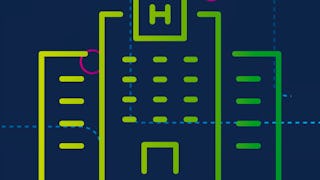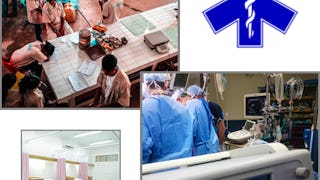Quality improvement methods were first deployed in healthcare in e hospital settings. However, over the past decade particularly, there has been increasing focus on the application of these methods in improving population and public health. In this course, you will apply a combination of both approaches to population health improvement. You will also learn how to study and evaluate large improvement initiatives to capture learning effectively.


了解顶级公司的员工如何掌握热门技能

积累特定领域的专业知识
- 向行业专家学习新概念
- 获得对主题或工具的基础理解
- 通过实践项目培养工作相关技能
- 获得可共享的职业证书

该课程共有4个模块
In this module you will contrast quality improvement methods with population health frameworks. You will also learn about the use of geographic information systems in quality improvement, along with the importance of good data visualisation. You will learn how to use funnel plots to understand variation in measures across organisations, units or geographies.
涵盖的内容
3个视频8篇阅读材料2个作业1个讨论话题1个非评分实验室
In this module you will study a well-known example of failings in a healthcare system, and the subsequent investigations and reports into what happened, thinking about parallels in population health. You will study published examples of quality improvement methods applied to population and public health improvement, reflecting on how lessons learnt in quality and safety might be applied in this context.
涵盖的内容
1个视频2篇阅读材料1次同伴评审2个讨论话题
In this module you will be given an overview of study designs for studying QI initiatives, including large national initiatives, with a focus on designs that optimise learning for future improvement. You will also reflect on the priorities and future directions for research in QI.
涵盖的内容
1个视频4篇阅读材料2个作业3个讨论话题
In this module, you will work on the capstone project of the specialisation. You will bring together what you have learnt across the three courses; from quality improvement methods, through evaluation designs for improvement initiatives, to improving population health. You will plan your own improvement initiative, tackling an important population health issue, and select methods suited to the problem.
涵盖的内容
1个视频1次同伴评审
获得职业证书
将此证书添加到您的 LinkedIn 个人资料、简历或履历中。在社交媒体和绩效考核中分享。
位教师

从 Public Health 浏览更多内容
 状态:免费试用
状态:免费试用Imperial College London
 状态:免费试用
状态:免费试用Imperial College London
 状态:免费试用
状态:免费试用Rutgers the State University of New Jersey
 状态:免费试用
状态:免费试用University of Houston
人们为什么选择 Coursera 来帮助自己实现职业发展




学生评论
49 条评论
- 5 stars
91.83%
- 4 stars
4.08%
- 3 stars
2.04%
- 2 stars
0%
- 1 star
2.04%
显示 3/49 个
已于 Aug 20, 2025审阅
An excellent course that combines theory with practice, covering key QI methods such as PDSA cycles and the Model for Improvement, applied to real-world public health challenges.
常见问题
To access the course materials, assignments and to earn a Certificate, you will need to purchase the Certificate experience when you enroll in a course. You can try a Free Trial instead, or apply for Financial Aid. The course may offer 'Full Course, No Certificate' instead. This option lets you see all course materials, submit required assessments, and get a final grade. This also means that you will not be able to purchase a Certificate experience.
When you enroll in the course, you get access to all of the courses in the Specialization, and you earn a certificate when you complete the work. Your electronic Certificate will be added to your Accomplishments page - from there, you can print your Certificate or add it to your LinkedIn profile.
Yes. In select learning programs, you can apply for financial aid or a scholarship if you can’t afford the enrollment fee. If fin aid or scholarship is available for your learning program selection, you’ll find a link to apply on the description page.
更多问题
提供助学金,
¹ 本课程的部分作业采用 AI 评分。对于这些作业,将根据 Coursera 隐私声明使用您的数据。

 中
中


